Declare and Display Christ: Reflections on Lausanne 4
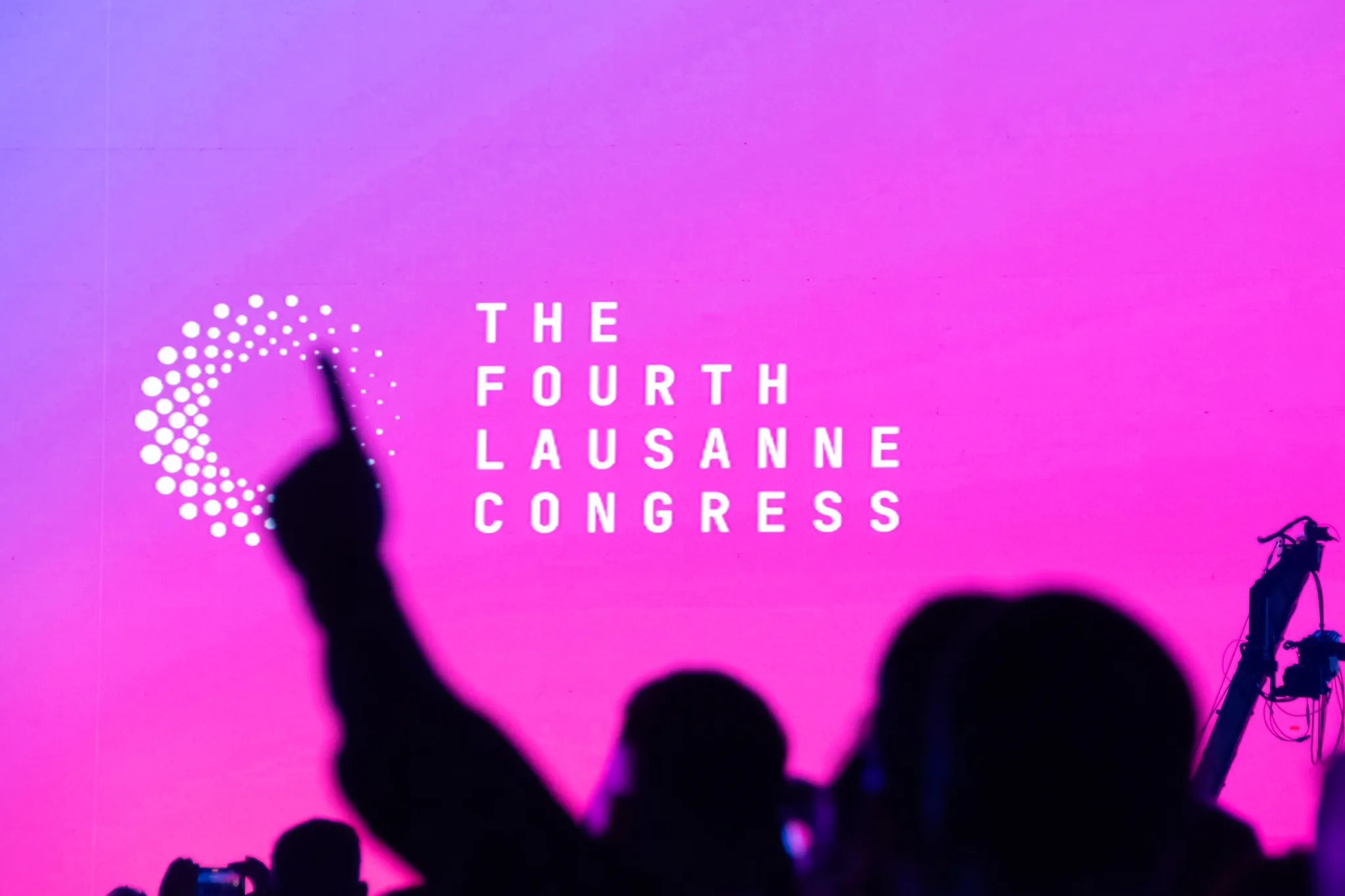
Some context about my faith
I’ve been a Christian all my life.
Christ was someone who was proclaimed all over the place wherever I went, whether it be on the magazines in Publix or through my favorite Christian radio station Z88.3. It was so prevalent in my childhood, my second-grade teacher even singled out a poor student because she was the only one who wasn’t a Christian (to be fair, it wasn’t malicious, just out of surprise).
That’s how ubiquitous Christianity was for me.
And to the Christian, you may think this is a blessing. And it certainly can be! The freedom to express Christ and His love is such a privilege. However, what often happens is that the church, and its body, becomes complacent. Christ becomes mainstream, the Gospel becomes redundant, and we become lukewarm.
I am certainly no stranger to this lukewarmth. While my faith journey has been marked with a lot of ups and downs, I have recently been in a lukewarm rut. Ever since I moved to the Bay Area, California, I’ve constantly wrestled with discontentment in my faith journey. While God has blessed me with material wealth in the form of a tech job, and while I’m grateful for this, I’ve also felt that I have hardly needed to rely on Him to get through the day.
It wasn’t always like this though. I had tasted something so sweet back in LA. I went to a church that celebrated the multicultural body; worship songs showing both English and Spanish lyrics at the same time. I witnessed a pastor who served with his people in all kinds of ministries, even devoting 9 months of learning Spanish so a young Spanish-speaking couple can have their older generation family hear the gospel in their language. I was in a small group of folks ranging from five to fifty-five, from all walks of life, a true melting pot.
I was so, so tired of the happy, overly optimistic image of Church, where grace is reduced to cheap soundbites and repentance is deemed too offensive. I don’t want to hear every week on how your dog’s doing, or your plans that evening. I wanted to hear about your soul. But most importantly, I wanted to feel my heart stir like before.
Three Weeks before Lausanne
While I was reeling over my discontentment, I picked up a ton of side hobbies and projects to keep myself occupied. One of these was the opportunity to serve as a mentor for Indigitous, a movement dedicated to empowering the younger, digital generation to use their gifts in the digital space to bring about the Gospel to the world. Each year, Indigitous takes on a few interns to equip them in tackling real-world challenges that are blockers for Gospel awareness and spread, and I was asked to help oversee one of these projects.
During the summer, Nick Wu, one of the directors of Indigitous US asked me if I was interested in tabling at a conference called Reach Conference. In my own words, this goal for this conference was an intersection of digital content-creators, gamers, and Christians, aiming to be a space where:
-
digitally-inclined Christians felt like they had a community to network and to befriend.
-
the intersection of digital spaces and the Gospel could be explored.
At the conference, I also got to meet another Indigitous US directory, Kyle Wu, and we hit it off instantly. We talked about all things ranging from Alpha strategy, to the technical excellence of Top Gun Maverick, to the narrative and exciting gameplay of Persona 5. We talked about podcast strategy, duked it out on smash (using joycons only, unfortunately), and even got to play some Magic the Gathering each night.
Nick, Kyle, and I ended up talking about a total of 10-15 hours in those two conference days. And while I had a good time sharing about hobbies (that, unfortunately, none of my Bay Area Christians shared), the bulk of our conversations rested on God and our relationships with Him and the Church.
We lamented how social rules prevent authenticity from flourishing in church culture.
We were frustrated at the hypocrisy of the Church that preaches the Gospel verbally, but do not care to reach to the least of those.
Yet we were hopeful for the next generation of believers, who also shared our convictions, that used this spiritual discontentment for the good and glory of God.
The night before our departure, Nick and Kyle mentioned that there was another conference that Indigitous would be present at; the Lausanne Congress in Seoul. I’ve heard of this congress before; during my time in a Perspectives class and during my involvement with the Joshua Project I’ve heard of this congress here and there.
To my surprise, they said they would be willing to give me an invite to the congress over in Korea. The only issue was that the congress was only two weeks away at the time, and I would need to make a last minute decision. I quickly called my wife and several other members at church, both for advice and for them to fill in any responsibilities I may have had during that week, and they were gracious to understand my situation.
With that, I accepted the invite, booked the flights two days later, and was ready to go.
Lausanne

For those unfamiliar, the Lausanne Movement is a movement that was started in 1974 from the modern evangelical titans John Stott and Billy Graham. The goal for this movement is to gather Christian leaders from around the world to strategize on how the Church can continue to fulfill the Great Commission. While Lausanne has multiple different meetups, such as the Young Leader’s Gathering and location specific conferences, global gatherings such as the Lausanne Congress in Seoul takes place once-a-generation; this would be the fourth global congress in 50 years.
Previous Lausanne Congresses have not only re-ignited momentum for the Gospel to be spread throughout all the world, they’ve also provided focus areas for the church that are still topics of conversation today. Ideas such as the Unreached People Groups (UPGs for short) and the 10/40 window were ideas and critical areas that came out of the conclusion of the first two Lausanne Congresses.
This year, in 2024, the Lausanne Congress took place in Incheon, inside the gorgeous Songdo Convensia. I had a feeling that the Lausanne Congress in Seoul would also pioneer a few additional movements, specifically in the digital space. After all, the last congress was in 2009, prior to the explosion of the technology industry. What we have now is miles ahead, and as such, a whole new mission field has been opened up to us in the form of digital community. More on this in another post.
Arrival
When I landed in Incheon, I was greeted with lovely Lausanne volunteers from multiple different Korean churches around the area. They spent the whole day Saturday and Sunday organizing Lausanne attendees, and organized shuttles and car rides to their respective hotels throughout Incheon. Even upon landing, I was witnessing how lovely it was to have different members of the body all together. I had great conversation with one of the Korean helpers who used art as a form of psychotherapy, rode on a Kakao taxi with a fellow Australian who marveled over Incheon’s architecture, and got to hear a bit the NGO’s started by some of my Indian brothers. If this was a glimpse of the conference to come, I was more than excited.
After dinner, we filed into the auditorium and met up with our plenary groups, groups that would be with us for the entirety of the week. My group consisted of wise men from New Zealand, Niger, Nepal, Canada, and Texas. These were missionaries on the field, board members of NGOs, teachers, and marketplace workers. It was inspiring to hear about all these different worlds and experiences that we have not lived.
The opening message for the night was given by a few chair members of the Lausanne Movement. It was then that we heard about the theme for the whole week:
Let the Church declare and display Christ together!
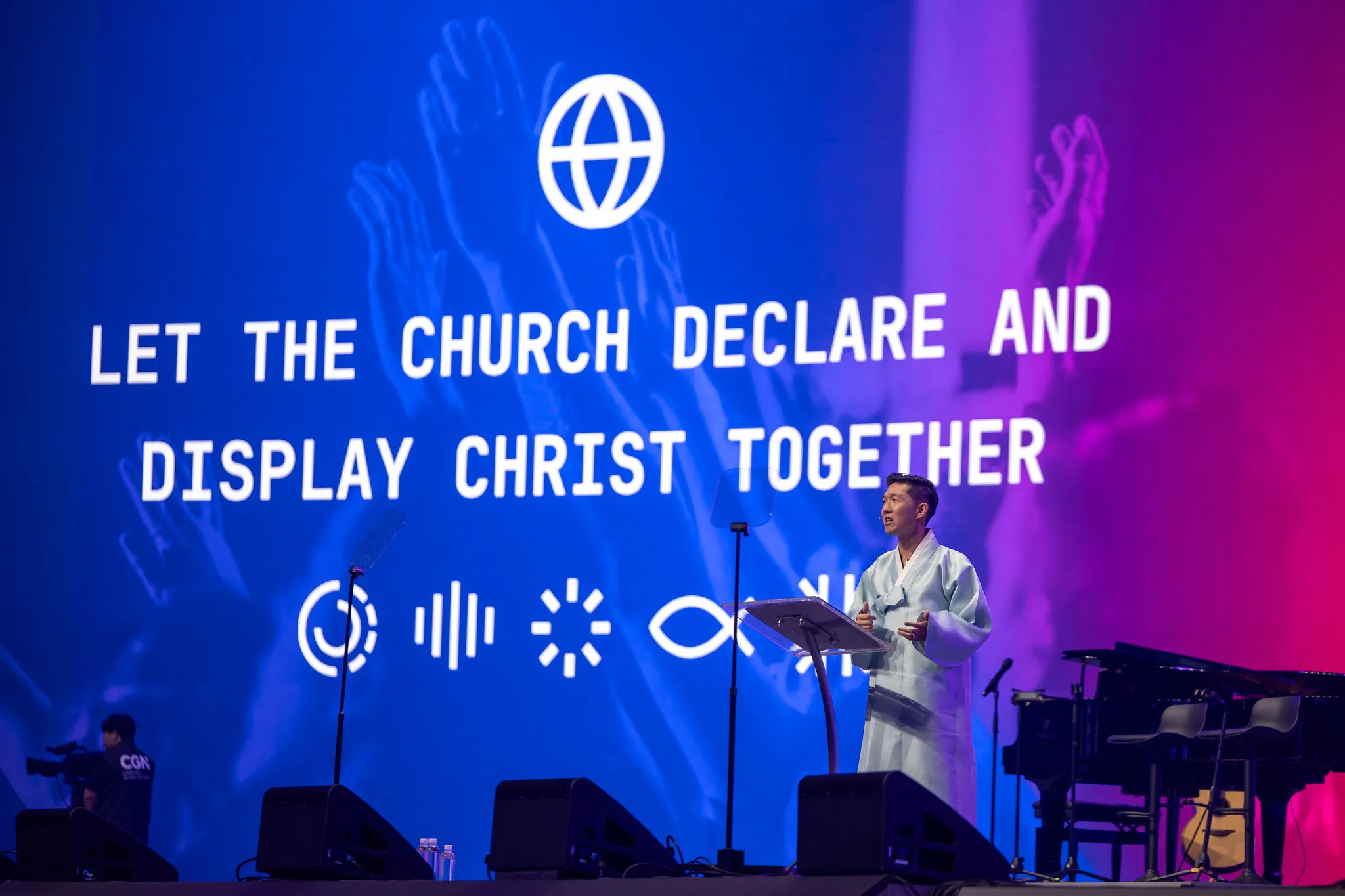
Michael Oh, the CEO of Lausanne, kicked off the week with a message of praise and lament. It was a praise because we had 5000 Christians representing 200 nations attending, eager to spread the Gospel and showcasing the diversity of the Church. However, it was a lament because of two major issues:
-
The number of people who have never heard of the Gospel increases year by year. The gap is not decreasing, it is increasing.
-
Our next generation is declining in terms of faith, they are expressing less interest. This is due to a combination of things; slower momentum and hypocrisy within the church. This leads to the two-fold strategy of both declaring Christ so that all have been able to hear, and to also display Christ so that the aroma of the Church is one of Jesus, not one of hypocrisy.
It was a night filled with joy and excitement, yet at the same time it was solemn and convicting. The Church celebrated its ongoing work for the Gospel, yet it also repented for our lack of action in other spheres of life. I was initially surprised to hear for constant calls for repentance for the Church’s lack of action and hypocrisy in modern times, but I was glad.
It was refreshing to know that Lausanne didn’t want to settle for God’s kingdom; there was responsibility set on us to stop this deceleration of the Gospel spread, and for us to truly be salt and light in this world. My heart was stirred, knowing that I had sat complacent before in both declaration and display. And I was hopeful to see how that we as a Church may change for His glory. This set the tone of the rest of the week.
The Week
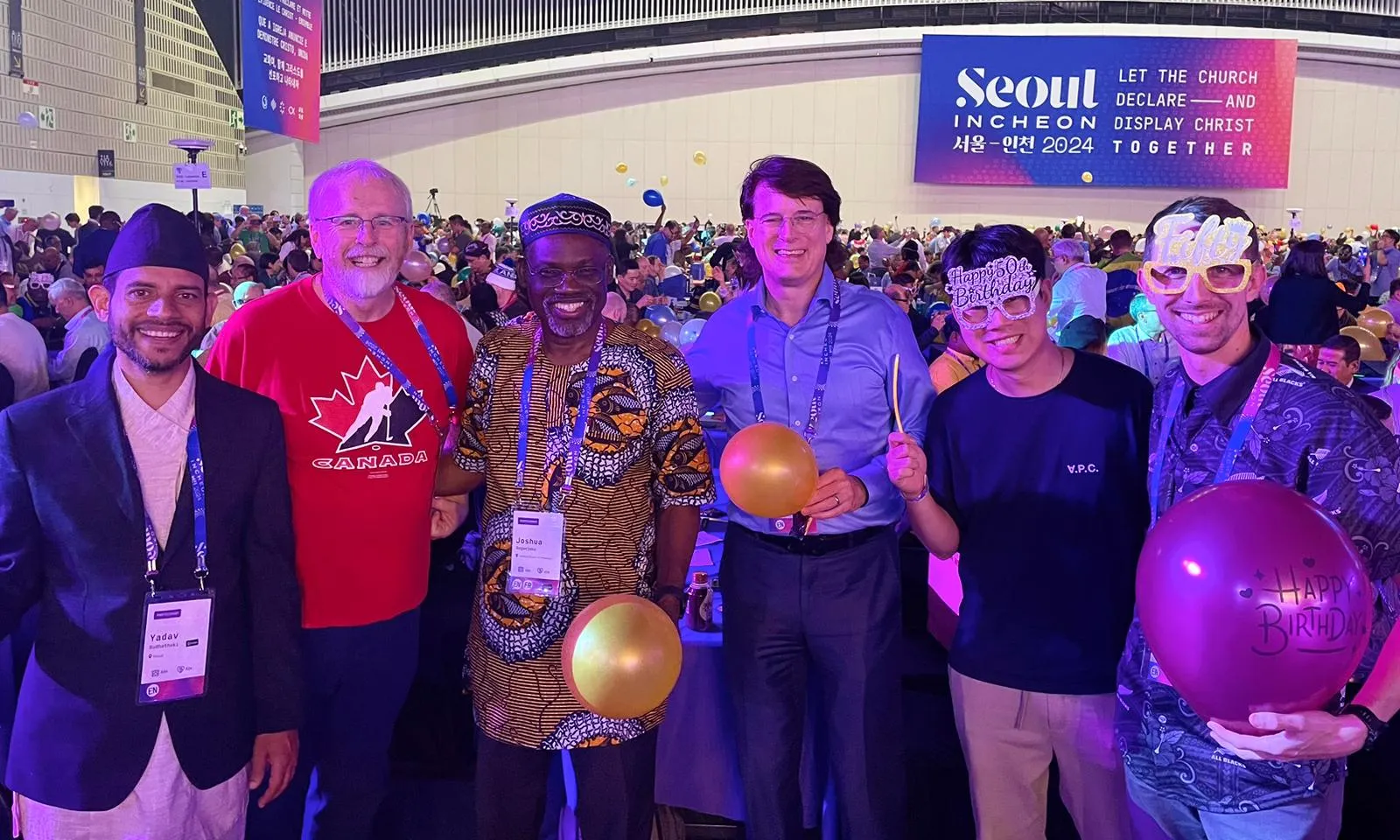 Throughout the week, we had the opportunity to hear from various leaders of faith from all parts of the world. A minister from Africa taught on the Holy Spirit, a pastor from Iran taught on persecution in the faith, and mission leaders from China shared about the importance of polycentric missions. We heard of persecution in Palestine, China, and in Israel. We heard of God’s providence and deliverance in areas like Indonesia and God’s faithfulness in areas like Ukraine. Hearing the lived experiences of our fellow brothers and sisters added to the gravity of it all. It was a good reminder for me, someone in the Global North, to hear about how offensive the Gospel can be, yet also faithful God is with His people during times of trial.
Throughout the week, we had the opportunity to hear from various leaders of faith from all parts of the world. A minister from Africa taught on the Holy Spirit, a pastor from Iran taught on persecution in the faith, and mission leaders from China shared about the importance of polycentric missions. We heard of persecution in Palestine, China, and in Israel. We heard of God’s providence and deliverance in areas like Indonesia and God’s faithfulness in areas like Ukraine. Hearing the lived experiences of our fellow brothers and sisters added to the gravity of it all. It was a good reminder for me, someone in the Global North, to hear about how offensive the Gospel can be, yet also faithful God is with His people during times of trial.
This insight wasn’t just limited to the talks either; several members of the Congress attended at risk of their own safety. For example, this is the first Congress we’ve had where members from China were able to attend, though at great risk to themselves. These individuals all wore white lanyards, indicating that their picture should not be taken and publicized to remain unknown to their local authorities. And deep down, I realized that some of these brothers and sisters amongst our midst may not return to their countries unscathed. It was a humbling reminder that their love for Christ and for His word to be known is so great, they were willing to sacrifice just to be a part of that mission.
Worship, too, was astounding. Each morning, the Getty Band would lead us into folk-style hymns, and we would conclude each night with worship from Isaiah 61, a Korean band with members coming from a variety of Korean churches. Voices from all around the world sang in unison to worship our Lord and Savior, and to worship in the different languages of the body was unreal. It reminds me of the day of Pentecost in Acts, when the Holy Spirit came and everyone began to worship in different tongues, yet people could all hear their own language being sung. I heard my New Zealand brother singing “How Great Thou Art” in Chinese with me, and then the next verse, we all switched to Spanish to join with our Spanish-speaking friends. What can be more empowering than that? What else can unite people of all nations like this, if not through Christ?
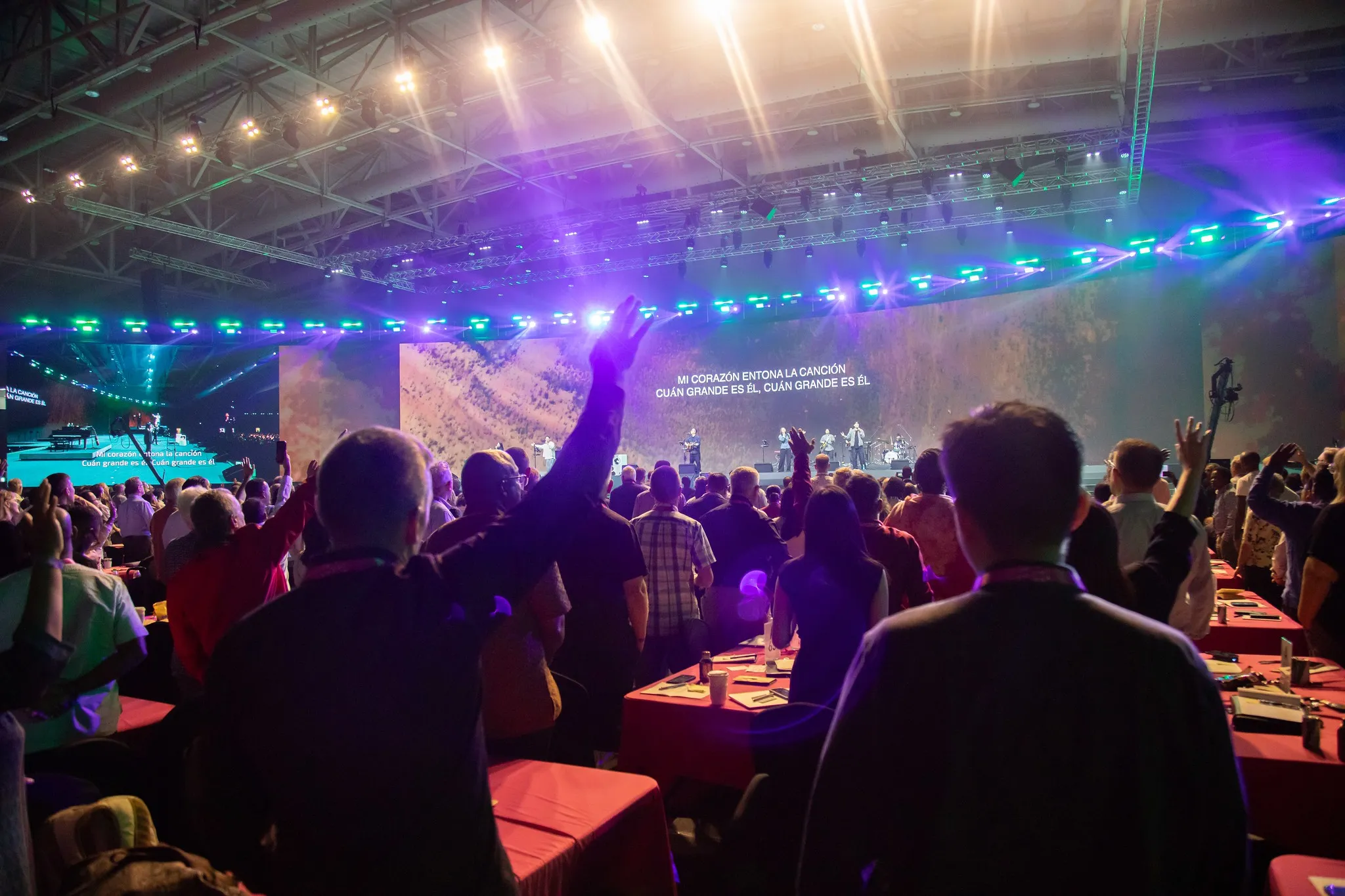
We had various other collaborative workshops throughout the week as well. In the afternoon, each individual was also scheduled a “Collaborative Gap” based on their survey responses. These gaps indicate a people group or a sphere of life that Gospel hasn’t fully permeated through. I was placed in the “Digital Communities” gap for the week, something I’ve been a part of for all my life and a community I dearly love. During our collaborative groups, we talked about our experiences with the digital community, our understandings of the digital community, and strategies on how to reach the digital community for the purposes of evangelism. I leave Lausanne with much to talk about in this regard, and I will add my thoughts about the digital community in another blog post.
Lausanne also began to emphasize the importance of equipping ALL Christians for the sake of the gospel, including those that were in the workplace. There was great emphasis on not neglecting the gifts and callings of marketplace Christians, yet at the same time, equipping the saints in the workplace is not something discussed often enough. Lausanne tried to foster these discussions on workplace ministry through the use of other collaborative tracks, but I personally felt that engaging with other young professionals was what helped me most see this more clearly.
Another active part of my involvement in the Congress was working with Indigitous. Indigitous played a large role in the Congress both in:
-
Shaping its focus and theme for the week (Ex: digital is the new future that we must embrace!)
-
Providing volunteer work for ensuring a smooth show
-
Offering different talks and mixers throughout the week.
Each night of the conference, I would often invite other young professionals of Indigitous to come and hang out; I came with no network and I wanted to get to know as many of these folks as I can. Some of these individuals I have worked with in the past online, but aside from Nick and Kyle, I had not seen anyone in this movement in person.
And I must say, the reunion of all of Indigitous was so sweet. I got to meet a fellow cohort partner two years later, and I also got to reconnect with a brother I met at Reach Conference. I met so many new folks from all over the world and got to serve them through acts of service and through lovely conversations. Each night, members of Indigitous would go out to eat Korean food after the day; we would converse over KBBQ, chicken galbi, and pounds and pounds of bingsu. I found some others in tech and we discussed some strategies on how to integrate faith, tech and work properly. I also talked with others that were working in para-church organizations, and discussed strategy for evangelism to the digital world through things like hackathons and internships. We dreamed big for what Lausanne could spark and expected God to do great work. It was a marvelous picture of what joyful partnership in the Gospel looked like.
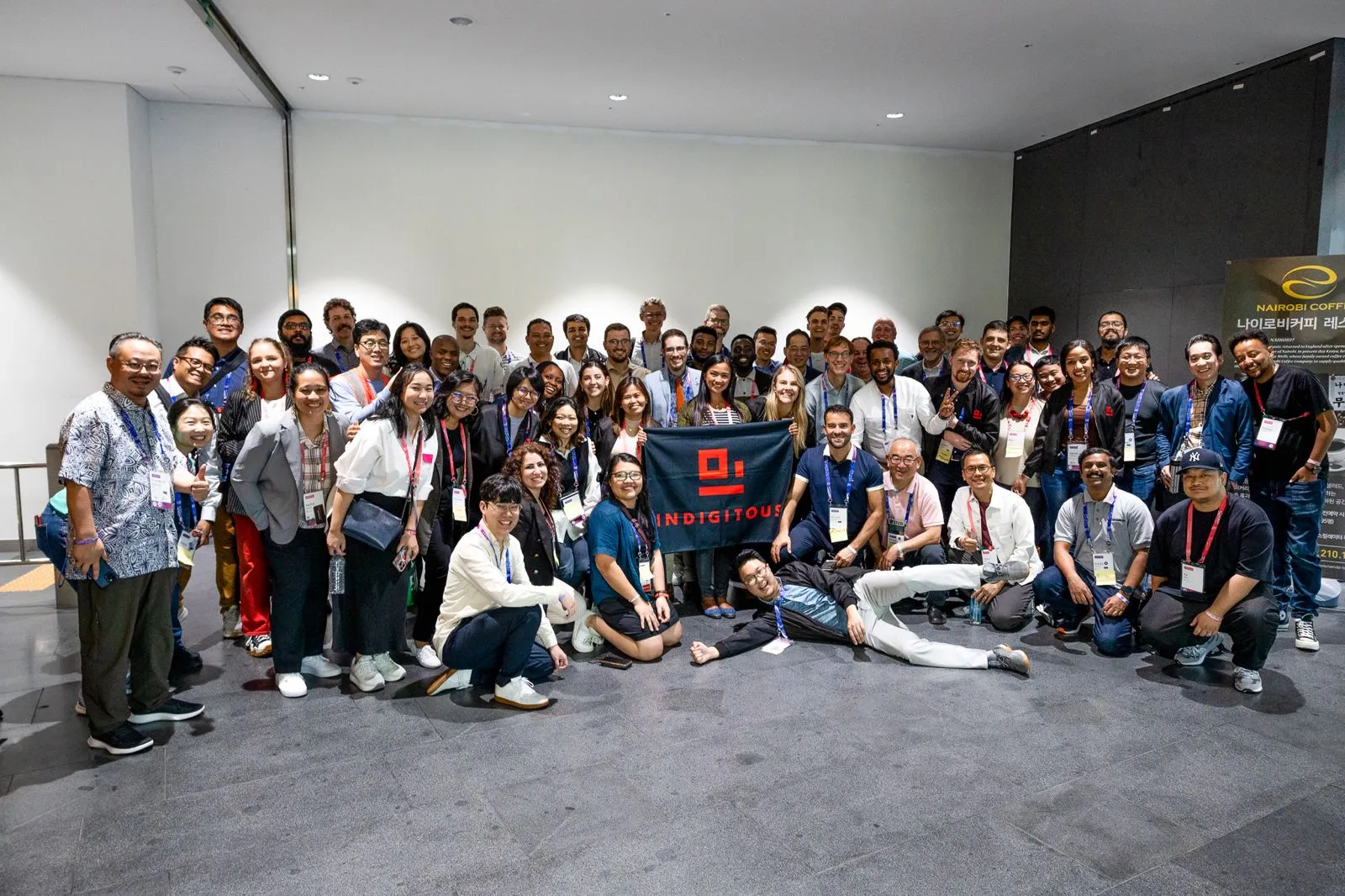
The whole week stirred my heart greatly. From serving with Indigitous, processing spiritual discontentment with my plenary group, to brainstorming over the digital community, I felt like my faith was being stretched in all directions for the sake of His kingdom. And while the congress was not perfect, it has been one of the best representations of heaven I have seen in my life; not often do I get to worship in four different languages, and not often do I get to be prayed over by brothers and sisters on the other side of the globe. Being in an environment where people live, breathe and think about the Gospel and His kingdom naturally, was incredible. The conversations I had with Kyle and Nick at Reach extended to all different members of Indigitous and several others throughout the Congress. The Spirit opened my heart greater than I thought it could be, engaging with and loving the neighbors from every nation at the conference.
Reflections
It was very difficult saying goodbye. When I woke up the day after Lausanne, it felt empty knowing that I had nowhere I needed to be. Despite the 13 hour days, I felt so energized by the people and the conversations centered around the Gospel; I never wanted it to end. I’ve processed throughout the week with various members of the body, and as a verbal processor, I was afraid that my thoughts would all disappear into the ether.
So I intend to restart blogging, writing and organizing this jumbled mess in my head into something hopefully cohesive. I feel like I had a lot to share back then, and I still have a lot more I want to share now. As mentioned above, I had many thoughts on how to reach the digital community and/or how to reach the younger generation, and I plan on writing a separate post about that. Instead, I intend to share my overall thoughts on the congress here.
-
I think my time at Lausanne has made me much more cognizant on how shortsighted the Global North can be, but also made me appreciate the resourcing and network that the Global North has. I’ve learned so much from my majority world friends on how to suffer, how to pray in the midst of persecution, and what it truly means to rely on God and have faith. I am glad that the voices of the global majority were heard at the Congress, but I have also heard of reports where they wished they were represented more in the celebration of 50 years.
-
My time at Lausanne made me realize how valuable workplace Christians are. In our collaborative groups, we worked with multiple theologians, ministry workers, and etc. They were able to provide great Scriptural backing on the Great Commission and had done extensive research on digital theology. But, we also noticed that strategy was our groups strongest suit. That was, until another business man decided to join our group, and he began to talk a lot about strategy. This made me realize, if we need to learn collaborate, dedupe, scale and reach ubiquity, the marketplace Christians have likely honed that skill more since that is the nature of the workplace. I’ve always been torn between the decision to stay in the workplace and/or pursue vocational ministry, but my time at Lausanne has helped me remain confident in my choice to remain in the workplace. I saw tangibly how my skills of collaboration and business-oriented thinking can help with the spread of the Gospel.
-
I saw how sweet the multicultural Church can be when we celebrate our diversity and we honor each other’s stories. Not just in worship and belonging, though that is dope too. I saw how diversity plays a huge role in the doing of the Great Commission. We’re in a time now where multicultural mission work is becoming polycentric, in which Christians from around the world are sending missionaries, not just the Global North. China, for example, is a country with much Christian persecution, but the Mission China movement still desires to see China as a mission force, not just a mission field. This rhetoric is being shared throughout the globe, and as a member of the Global North it is so humbling and exciting to see mission forces being spawned throughout the globe and to learn about their tactics.
-
I was validated in my thoughts that intersecting the Gospel with technology is necessary in order to finish the Great Commission. I had joined Lausanne to hear about their thoughts on technology’s place in the kingdom of God, and I was happy to hear a constant drumbeat that digital is here to stay, and that the church must adopt it. However, though the pulpit declared technology’s necessity, I also noticed in my workshops that addressing the gap of digital technology is a multi-pronged issue that is not easily solved. The latter half of my week was devoted to hearing and strategizing on how to fill in this gap, which leads me to my next point.
-
I realized that I have a voice to contribute, even if I don’t have all the accolades. I’m a pretty opinionated person, but I try my best to keep them to myself unless asked. Coming into Lausanne with no connections and no network, I felt that my role there was to sit and listen and hear from the giants of the faith. However, during my week at the digital community Collaborative Gap, I realized that even those that are well decorated have little to say on this gap, whereas I, someone who was shaped by it, had much to say. And when I decided to share my opinions, folks encouraged me to share more. This is one of the main reasons why I am sharing my reflections in the form of a public blog post, not just in one-on-one conversations.
-
I was frustrated with the latter half of Lausanne because I believe they emphasized too much on talks, and less on strategy. The initial few days were great in stirring the hearts of me and other individuals, but future sessions became more informational and “safe”. You have to remember that the individuals attending this conference are those that are leaders of the Church; while reminders of basic truths are good, I was expecting something a bit more pointed, convicting, and/or strategic in our sessions in the latter half of the week.
-
I wish there was more representation by individuals that are Gen Z and/or folks deeply ingrained in the digital community. These two spheres were emphasized to the utmost importance, yet it was rare that members in this community were able to share their experiences and strategies to bridge this gap (we did have a panel interviewing Gen Z Christians, but it felt very shallow to me). Lausanne made way for the Korean church to run a plenary detailing the history of Korean Christianity. I had hoped they would have done the same for Gen Z and the digital community; empowering them to share their experiences to the global Church, not just within their own circles.
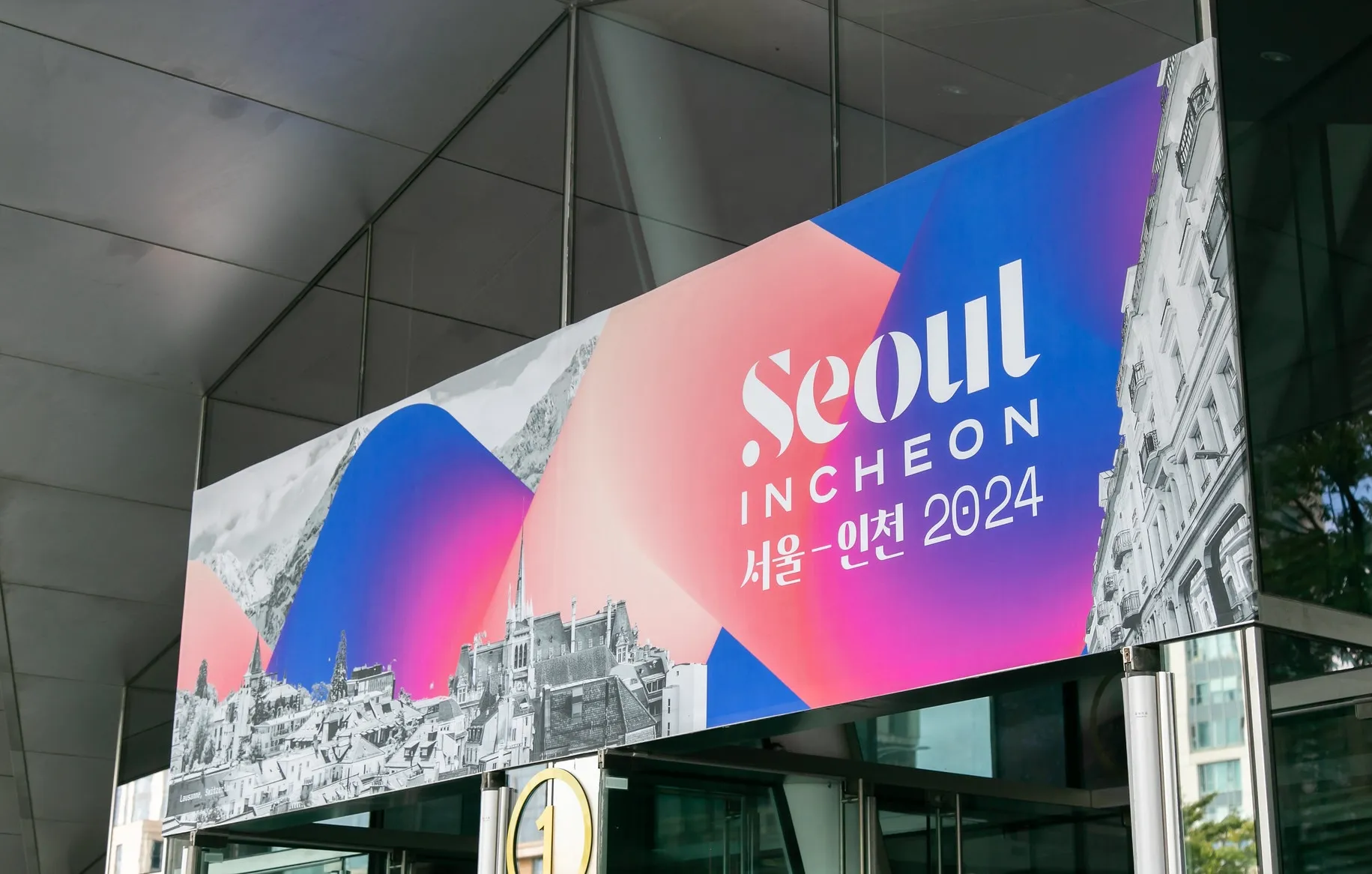 I entered Lausanne expecting something grand, and God had definitely made it so. However, while my initial intention was to observe and absorb from the leaders of the Church, God had different plans. I leave Lausanne with a heart stirred, excited for the Gospel to be spread within my generation and in my community, but also discontent with our lack of representation. But I’ve also seen that this spiritual discontentment can be the catalyst to movement, and I intend to not let it stagnate.
I entered Lausanne expecting something grand, and God had definitely made it so. However, while my initial intention was to observe and absorb from the leaders of the Church, God had different plans. I leave Lausanne with a heart stirred, excited for the Gospel to be spread within my generation and in my community, but also discontent with our lack of representation. But I’ve also seen that this spiritual discontentment can be the catalyst to movement, and I intend to not let it stagnate.
